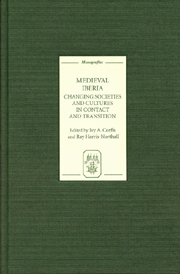Book contents
- Frontmatter
- Contents
- Acknowledgements
- Introduction
- Part 1 SOCIAL AND CULTURAL MINORITIES IN CHANGING SOCIETIES
- The Converso Condition: New Approaches to an Old Question
- Speaking through Many Voices: Polyphony in the Writings of Teresa de Cartagena
- Chains of Iron, Gold and Devotion: Images of Earthly and Divine Justice in the Memorias of Doña Leonor López de Córdoba
- Part 2 CONTACT AND CONFLICT: PERSPECTIVES ON HISTORY AND CULTURE
- Part 3 TRANSMISSION OF LEARNING AND TEXTS IN CHANGING CULTURES
- Part 4 LINGUISTIC CONTACT AND CHANGE
- Index
Speaking through Many Voices: Polyphony in the Writings of Teresa de Cartagena
from Part 1 - SOCIAL AND CULTURAL MINORITIES IN CHANGING SOCIETIES
Published online by Cambridge University Press: 12 September 2012
- Frontmatter
- Contents
- Acknowledgements
- Introduction
- Part 1 SOCIAL AND CULTURAL MINORITIES IN CHANGING SOCIETIES
- The Converso Condition: New Approaches to an Old Question
- Speaking through Many Voices: Polyphony in the Writings of Teresa de Cartagena
- Chains of Iron, Gold and Devotion: Images of Earthly and Divine Justice in the Memorias of Doña Leonor López de Córdoba
- Part 2 CONTACT AND CONFLICT: PERSPECTIVES ON HISTORY AND CULTURE
- Part 3 TRANSMISSION OF LEARNING AND TEXTS IN CHANGING CULTURES
- Part 4 LINGUISTIC CONTACT AND CHANGE
- Index
Summary
Ever since Deyermond first brought Teresa de Cartagena (c.1420 – c.1460) to our attention in 1976, and then again in 1983, this time in the context of other female authors of late medieval Spain, the scholarly bibliography on Teresa and others – e.g., Leonor López de Córdoba and Florencia Pinar – has expanded rapidly. The feminist scholarship is especially admirable but still has much more to tell us about her and her irruption into a world of writing dominated by men. These and other new developments in Teresa scholarship have illuminated such crucial areas as her social context, family associations, her love of learning and the desire for God (as Leclercq expressed it), and her status as precursor to Teresa of Ávila and Sor Juana Inés de la Cruz.
In this essay, my principal goal is to review Teresa's two works – Arboleda de los enfermos and Admiraçión operum Dey – not so much for what she says in them as for the varied voices she adopts effectively to think through her mission as author. To this end, I present and, in part, categorize a variety of voices that the readers will find blended with her own. These variations in voice accompany, or are the result of, the various attitudes, postures or roles she assumes within these two works. As we will have occasion to observe, several of these voices are channeled by Teresa: that is, she becomes the instrument of their ‘speaking’ in both texts.
- Type
- Chapter
- Information
- Medieval IberiaChanging Societies and Cultures in Contact and Transition, pp. 16 - 29Publisher: Boydell & BrewerPrint publication year: 2007



